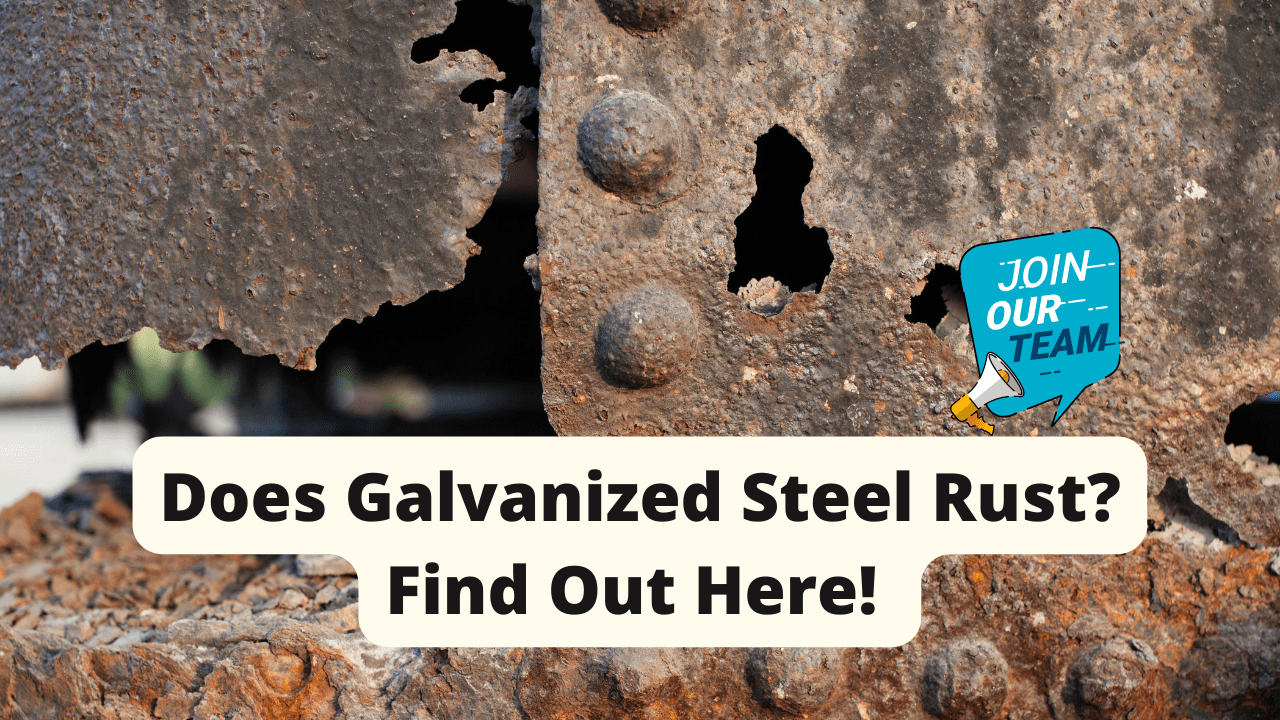You might think that galvanized steel doesn’t rust since it’s meant to protect steel from rusting and corrosion, but this isn’t actually true! While galvanized steel doesn’t rust as quickly as un-galvanized steel does, it does still eventually rust, and this rust has the potential to ruin your beautiful piece of galvanized steel unless you take precautions against it. Find out what you can do about galvanized steel rust here!
Galvanized steel is one of the most common types of steel today, used in everything from cars to storage sheds. Because it’s treated with zinc or another metallic compound to prevent corrosion, many people wonder if galvanized steel will ever rust. The good news is that galvanized steel does not rust on its own; however, it can still be exposed to elements that may cause rust to develop over time. Read on to learn more about the topic and whether you need to do anything to protect your galvanized steel in the future.
What Is Galvanized Steel?
Galvanized steel is steel that has been coated in a layer of zinc. This protects the steel from corrosion and can extend its lifespan. However, galvanized steel will eventually rust. The zinc protects the steel by sacrificing itself – when the zinc rusts, it creates a barrier that prevents the steel from rusting. There are two types of galvanized steel: hot-dip galvanizing and electroplating. Electroplating does not create a protective layer, so it will not last as long as hot-dip galvanizing.
What does galvanized mean?
Galvanization is the process of applying a protective zinc coating to steel or iron in order to prevent rusting. The most common method is hot-dip galvanizing, in which the metal is dipped into a vat of molten zinc. This creates a tough, metallurgically bonded zinc coating that will last for decades, even in harsh environments. However, galvanized steel can still rust over time – particularly if it’s damaged or exposed to salt water. But the good news is that galvanized steel rusts much slower than regular uncoated steel. So if you’re looking for a rust-resistant option, galvanized steel is definitely worth considering.
How Fast Does Galvanized Steel Rust?
When it comes to rust, there are a lot of variables at play. The type of steel, the environment, and even the way it was galvanized can all affect how fast or slow it will rust. In general, however, galvanized steel does tend to rust more slowly than other types of steel. It is a common misconception that galvanized steel doesn’t ever rust, but this is simply not true.
Galvanized steel will still oxidize over time – though generally not as quickly as other types of steel – due to exposure to air and water in the environment. There is no such thing as an ironclad guarantee against corrosion for any type of metal out there on the market today, but if you have a need for a particular kind of corrosion-resistant material with fewer chances for surface oxidation then your best bet would be stainless steel products instead.
Why Do People Get Confused About Galvanized Steel Rust?
Many people believe that galvanized steel will not rust because it is coated with a layer of zinc. However, this is not true. The zinc coating actually protects the steel from rusting for a period of time, but eventually, the zinc will corrode and the steel underneath will be exposed to the elements and begin to rust. The confusion likely arises because people see galvanized steel used in a lot of outdoor applications, such as fences and roofs, and assume that it must be rust-proof.
Surface Preparation Affects The Rust Process
You’ve probably seen galvanized steel before – it’s often used in construction and for making pipes and other metal objects. Galvanized steel is coated with a layer of zinc, which helps protect it from rusting. However, even galvanized steel can eventually succumb to rust. The amount of time it takes for galvanized steel to rust depends on the thickness of the zinc coating and the environment the steel is exposed.
What Should I Do If My Property Has Rusted Pipes?
If your property has rusty pipes, you can do a few things to mitigate the problem. First, identify the source of the rust. This could be due to high iron content in your water, exposure to salt water, or even just old age. Once you know the source, you can take steps to prevent further rusting. For example, if it’s due to the high iron content in your water, you can install a water filtration system. If it’s due to exposure to salt water, you can coat the pipes with rust-resistant paint or sealant. And if it’s simply due to old age, you may need to replace the pipes altogether. No matter the cause, there are ways to prevent and fix rusty pipes.
How Can I Prevent My Properties From Being Damaged By Pipes Rusting?
Galvanized steel pipes are used in a variety of industries because they are resistant to corrosion. However, over time, the zinc coating on these pipes can break down, which can lead to rusting. If you have galvanized steel pipes on your property, it is important to monitor them for signs of rusting and take steps to prevent further damage. Here are some tips:
- Inspect your pipes regularly for any signs of rusting or wear and tear.
- If you notice any corrosion, clean the affected area with a wire brush or sandpaper.
- Once the area is clean, apply a fresh coat of paint or zinc primer.
- If the damage is severe, you may need to replace the affected section of the pipe. -It is also advisable to look into other materials that are more durable than galvanized steel.
- One option that has been shown to be very durable is stainless steel pipes. These will not corrode like other metals and do not require an additional protective layer of paint or zinc plating.
Where does the zinc come from in Galvanized Steel Rust?
Zinc is a chemical element with the symbol Zn and atomic number 30. It is the first element in group 12 of the periodic table. In some respects, zinc is chemically similar to magnesium: both elements exhibit only one normal oxidation state (+2), and the Zn2+ and Mg2+ ions are of similar size. Zinc is the 24th most abundant element in Earth’s crust and has five stable isotopes. The most common zinc ore is sphalerite (zinc blende), a zinc sulfide mineral. The largest workable lodes are in Australia, Asia, and the United States. Zinc is refined by froth flotation of the ore, roasting, and final extraction using electricity (electrowinning).
What happens when it’s exposed to oxygen and water?
Rusting is a natural process that happens when the iron is exposed to oxygen and water. The oxygen reacts with the iron to form iron oxide, which is commonly known as rust. The water helps to break down the iron oxide so that it can spread through the metal. This process can happen quickly or slowly, depending on the conditions. Galvanized steel is coated with a layer of zinc, which helps to protect it from rusting. However, over time, the zinc will start to wear away and the steel will be exposed to oxygen and water again. If you live in an area with high humidity or salt air, your galvanized steel may start to rust more quickly.
How long does it take for Zinc to deteriorate from outside elements?
Zinc is a chemical element with the symbol Zn and atomic number 30. It is the first element in group 12 of the periodic table. In some respects, zinc is chemically similar to magnesium: both elements exhibit only one normal oxidation state (+2), and the Zn2+ and Mg2+ ions are of similar size. Zinc is the 24th most abundant element in Earth’s crust and has five stable isotopes. The most common zinc ore is sphalerite (zinc blende), a zinc sulfide mineral. The largest workable lodes are in Australia, Asia, and the United States.
Prevention, Handling, Cleaning, Maintenance Tips & Products for Safe Use
Galvanized steel is steel covered with a thin layer of zinc to protect it from corrosion. But does this mean that galvanized steel doesn’t rust? The answer is complicated. While galvanized steel does have a higher level of corrosion resistance, it is not completely immune to rusting. When exposed to moisture and oxygen, the zinc coating can oxidize and corrode which will lead to rusting. There are many factors that can affect how quickly galvanized steel will rust, such as exposure time and material thickness.
To maintain the integrity of your metal roof or exterior siding, you should take precautionary measures like using clean water for washing off dirt before it dries on the surface or applying a protective coating such as paint or sealant after cleaning and before any exposure to water.
Contact Us
Published in The Blog MWPBNP, August 29th, 2022.
Like mwpbnp.com.pakistan on Facebook, follow @mwpbnp_pakistan on Twitter to stay informed and join in the conversation.

